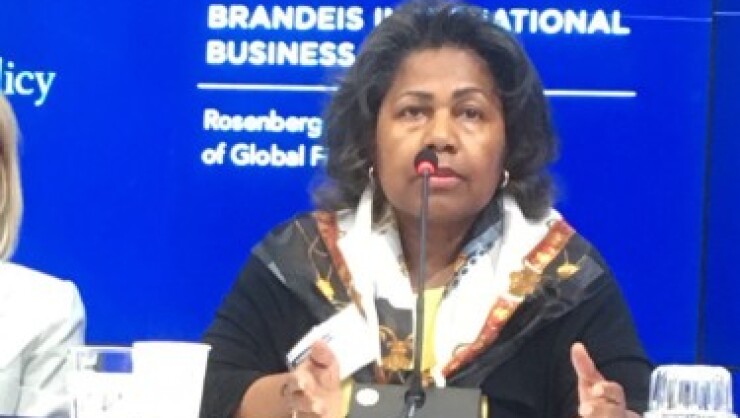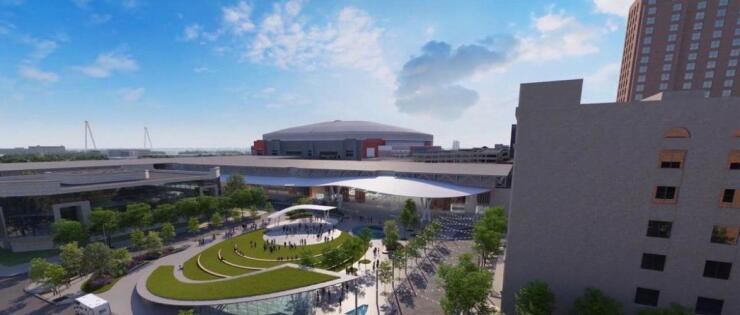St. Louis and Indianapolis convention center expansion plans are moving forward with one set to enter the market next week and the other awaiting final governmental approval as the timing of the sector’s post COVID-19 recovery remains clouded.
Backers of both expansions are pushing the projects as a means to both stay competitive in a post-pandemic environment and to infuse their local economies with jobs. When convention and trade business will pick up depends on the development of effective treatments, a widely available vaccine and consumer sentiment and trends that could emerge as the disease subsides.
St. Louis will issue $105 million of leasehold revenue bonds next week through the St. Louis Municipal Finance Corp. The city will eventually rely on hotel and restaurant taxes to repay the bonds but is obligated to make rental payments that cover debt service on the bonds from any available revenues under the lease agreement subject to an annual appropriation.
“If funds derived from these taxes are insufficient to pay debt service on the series 2020 bonds, the deficiency may be made up from other revenues deposited into the city’s general fund,” the offering statement reads.
Proceeds will finance the city’s share of a $210 million expansion of the Cervantes Convention Center in downtown St. Louis. It’s the first major expansion of the 43-year-old facility since 1993. The center is part of the America’s Center convention complex which includes the Dome — the home of the National Football League’s Rams before they moved back to Los Angeles in 2016.
Siebert Williams Shank & Co. LLC is senior manager and Stern Brothers & Co. is co-senior manager. PFM Financial Advisors LLC is advising the city.
The expansion had long been in the works, but some public officials' concerns over plummeting revenues tied to convention business and related taxes delayed the approval.
The deal’s structure, with capitalized interest and then back-loaded principal payments that don’t begin for nearly two decades, was constructed to allow the city to tap hotel and restaurant taxes once they are freed up. Ultimately, it’s the city’s ability to tap any available revenues that investors will consider, said one trader.
“Although the city's hotel-and-restaurant-tax revenue streams have been negatively affected by COVID-19 and the related recession, we note that series 2020 bond principal starts in October 2039 after the city's other convention center bonds mature and that interest is capitalized through October 2022,” Standard & Poor's Global Ratings said.

The bonds are rated A with a negative outlook from S&P, one notch lower than the city’s general obligation rating, to reflect the need for an annual appropriation. “We view these bonds as having a strong relationship to the city” as the center is considered essential to the city’s economy, S&P said.
The bonds are tentatively structured to mature in 2049 with bond insurance to be determined.
The city and St. Louis County agreed to jointly finance the expansion even as the convention center’s operations remained at a standstill as large gatherings were banned as part of efforts to slow the pandemic’s spread.
“Expansion of America’s Center is an investment in the future of our region, assuring dependable jobs for working families in these challenging times and demonstrating our commitment to businesses and workers is certain,” Comptroller Darlene Green said in a statement earlier this year. “We must plan for a positive future for the working families in our region, and America’s Center is part of that future.”
The city will eventually tap $5 million that it continues to pay toward the Dome debt and $1 million for maintenance as well as $17.7 million that goes to convention center debt. The Dome bonds will be paid off in 2022 so the deal capitalizes interest until then. The maintenance obligation ends in 2024 and the previous convention center debt is retired in 2039 — when principal payments begin on the new bonds.
While the city has some breathing room for those taxes to pick up before being needed for the new debt, the near-term damage from the pandemic and recession could strain city coffers.

“Reduced hotel and restaurant taxes in fiscal 2021 — which the city uses to partially pay debt service on some appropriation debt, including convention center lease revenue bonds — could cause the city to use additional general fund resources to make up the difference, pressuring the budget” and “liquidity,” S&P warned.
The city of 301,000 has $1.2 billion of general obligation, appropriation-backed, tax-increment-financing, and capital leases outstanding.
The pandemic plays prominently in the offering statement, with 121 references to both its impact on city finances and on the convention center’s operations.
The city closed a $39 million fiscal 2020 budget gap through cuts, ending the year with a $1.6 million surplus. The city also benefitted from $35.3 million in Coronavirus Aid, Relief, & Economic Security Act relief and additional emergency grants for a total of $59 million in relief.
The city’s 2021 budget doesn’t rely on reserves, although it projects earnings-and-payroll taxes will fall by 16% and sales taxes will drop by 20%. Hotel taxes were down 7% to $8.8 million in fiscal 2020, as occupancy fell to levels of between 20% and 40% from March through August.
The convention center reopened at reduced capacity levels in June and, through Sept. 24, two large events were held along with some meetings. A total of 19 events had been cancelled but in addition to the two that were then held, eight have been booked for later dates.
The duration, severity and degree of the impact of the COVID-19 pandemic is extremely difficult to predict at this time” and will take some time to “determine the full impact that the various events surrounding COVID-19 will have on its economy, budget and financial condition,” the offering statement reads.
S&P moved its outlook to negative in June. “While we think strong financial management practices have allowed the city to withstand recent budgetary challenges, we expect COVID-19 will likely press management's skills to the maximum as related recessionary effects take their toll on city revenue,” S&P said.
“If the COVID-19 pandemic and the ongoing recession lead to steeper-than-expected declines in the city's convention and tourism sectors and in earnings and payroll taxes, resulting in a significant reduction to available reserves, we could lower the rating,” warned analyst John Kenward.
Indianapolis is advancing through the approval process on $155 million of borrowing to expand the Indiana Convention Center in downtown Indianapolis, including adding a ballroom and expanding meeting space. Two new hotels would be financed by developers.
Tax-increment financing revenue that now goes to the Marion County Capital Improvement Board and TIF revenue generated by the new hotels would repay the bonds.
The City-County Council last month approved the plan and the Metropolitan Development Commission is expected to vote on it at a meeting Wednesday.
Backers led by Mayor Joe Hogsett say the expansion is needed so that Indianapolis can lure larger conventions and trade shows it now loses to larger facilities and the construction work will help the economy.
The convention center’s public owner — the Marion County Capital Improvement Board — will manage the financing and construction.
Other Midwest-based convention centers have recently completed transactions. The Wisconsin Center District, which owns the Milwaukee convention center, over the summer sold refinancing bonds to ease debt service pressures and pave the way for an approved expansion. The Metropolitan Pier and Exposition Authority sold restructuring bonds that pushed off near-term debt payments to buy itself some financial breathing room.





